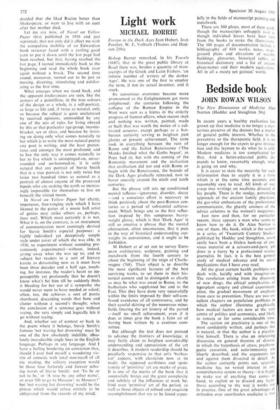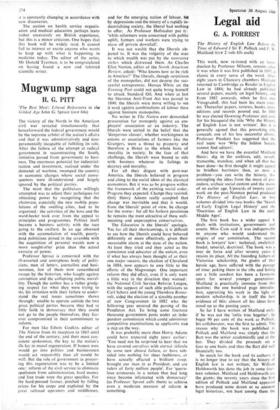Bedside book
JOHN ROWAN WILSON
The New Dimensions of Medicine Alan Norton (Hodder and Stoughton 50s) In recent years a healthy realisation has grown up that medicine is no longer a mys- terious preserve of the doctors but a matter of general public interest. Whether in the preventive or the therapeutic field, it is no longer enough for the expert to give instruc- tion and the layman to do what he is told. Modern medicine is too complicated for that. And a better-educated public de- mands to know, reasonably enough, what is going on and why.
It is easier to state the necessity for such information than to supply it in a form which is at the same time accurate and reasonably easy to read. All kinds of vice creep into writings on medicine directed at lay people. There is the stodgy, patronising approach of the ancient family physician, the gee-whiz enthusiasm of the professional communicator, the ghastly cosiness of the advice columns in the women's magazines.
Just now and then, for no particular reason, there appears a man who seems to know how to do it. Dr Alan Norton is one of them. His book, which is the second in a series of 'Twentieth Century Studies' ,published by Hodder and Stoughton, could easily have been a lifeless hash-up of pre- vious material or a scissors-and-paste job done in a hurry by a professional science journalist. In fact, it is the best general study of medical advance and its social implications that I have ever read.
All the great current health problems are dealt with, lucidly and with imagination. The revolution arising from the discovery of new drugs, the ethical complexities of twrisplant surgery and clinical experiment- ation, the gradual movement of emphasis from cure to prevention. There are two ex- cellent chapters on population problems in which the author illustrates graphically how medical factors are now at the very centre of politics and economics, and likcl to remain so for some considerable time The section on psychiatry is one of the most confidently written, and perhaps this is natural, in that the author is a psychia- trist himself. There is also an interesting discussion on general theories of disease. in which the hypothesis of stress, psychoso. patic causation, and auto-immunity are clearly described, and the arguments for and against them dissected in detail. As the author correctly points out, scientific medicine has no vested interest in any comprehensive system or theory—it is hapPY to make use of anything that comes to hand, to exploit or to discard any hYPo" thesis according to the way it works out in practice. One of the great advantages of orthodox over unorthodox medicine is that
It is constantly changing in accordance with new discoveries.
The section on health service organis- ation and medical education perhaps leans rather excessively on British experience, but this is a minor criticism. One hopes that this book will be widely read. It cannot fail to interest or excite anyone who wants to keep up with what is happening in medicine today. The editor of the series, Mr Donald Tyerman, is to be congratulated on having found a new and talented scientific writer.



































 Previous page
Previous page